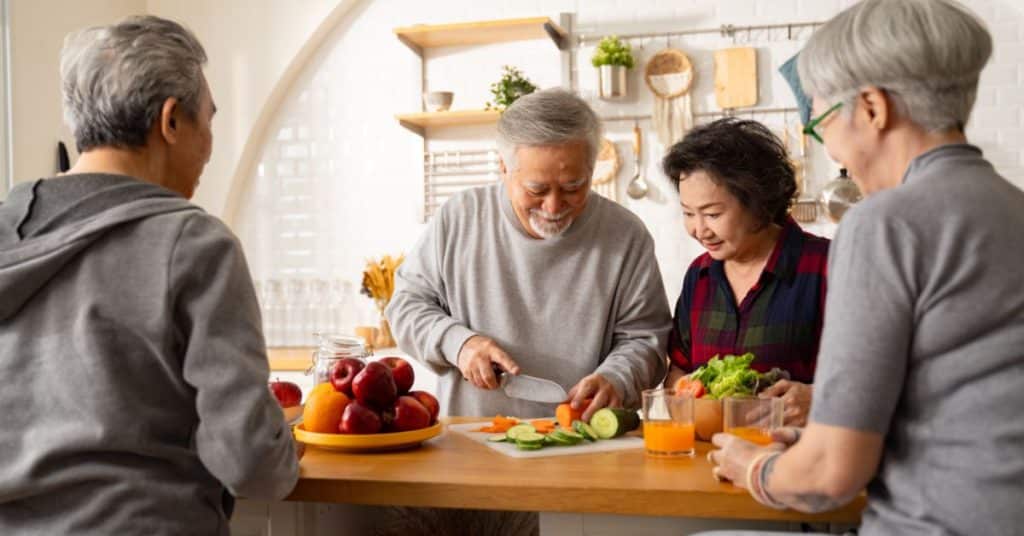

Having spent an entire professional career observing human behavior as a licensed clinical social worker and certified professional coach and witnessing the sheer determination it takes for people to make permanent changes to improve the quality of their lives, I thought it was time for me to reflect on what I see as some of the biggest challenges we face as change agents trying to show others the benefits of adopting a whole food, plant-based (WFPB) lifestyle.
How many times have I heard students of the T. Colin Campbell Plant-Based Nutrition Certificate say, “I just don’t know what to do with all this great information now that I’ve earned my certificate” or “I have this idea, but I don’t know how to bring it to fruition.”
I’d like to explore this issue of moving from intentions to actions, but first, let me address the notion of courage. I think it is fair to say that all of us are confident that we could improve the health and well-being of others if they only knew what we knew about the research supporting a WFPB lifestyle. When trying to deliver this life-saving message to others we often find that they are not open or ready to hear what we have to say. It can be discouraging and frustrating when they continue along their merry way with no intention of changing. It can also cause us to question whether we have the fortitude to stay the course and continue to speak what we know to be true. This is where courage comes in. We are courageous when we realize that not everyone will be open or ready to hear our message but never give up on trying to improve the lives of those we encounter because we know that if we reach even one person, we will have changed the course of his or her life for the better—forever.
So we try to lead by example, hoping that what others see in us will motivate them to try something new. We persevere, always aware that we are role models for healthy living as we continue to plant the seeds for change in others. Sometimes we see the results when someone decides to move towards a healthy diet; other times, not. What is important to remember is that we never really know what impact we might have on another human being.
I remember sitting next to a pastor at our dinner table at the 100th birthday party for a dear friend in Boca Raton, Florida, a few months ago. He and I started chatting, and I quickly learned that he was struggling with high blood pressure, diabetes, and obesity. He ate the standard American diet and was curious about the vegetable plate I was having for dinner that night. I gently told him the story about my near-death experience from a heart attack and emergency bypass surgery eight years ago and what I had since learned to save myself from having this happen to me again. He listened and seemed very interested, albeit letting me know how much he enjoyed his meat and ice cream every day. I told him about Dr. Caldwell Esselstyn’s book, Prevent and Reverse Heart Disease, and also about the book I had recently published, Staying Alive—Healing from Heart Disease, A Survivor’s Story. Several weeks passed, and one day, I checked the reviews on Amazon to see what people were saying about my book. And there it was. The pastor said he had recently met me and talked with me at length about disease prevention and health and that he was excited to read my book. So, you see, you never know when those seeds you have planted may take hold and grow.
So, how do we continue to plant these seeds for change when we sense the resistance to a WFPB lifestyle all around us? Here are some steps I suggest for turning good intentions into positive actions:
- Set yourself a realistic goal. If you love to cook (as I do), tell yourself, “Ok, I love the food that I eat and want to show others how to prepare and enjoy it.” You might do as I’ve done by creating a Meetup group that brings people together to learn how to cook this new way. Remember, any goal (big or small) is a great one and a good start.
- Consider the obstacles you might face. Using my cooking club example, you might not have a kitchen that accommodates many people. What might you do to overcome this hurdle? There are many things you can consider. Perhaps you could reach out to a high school in your neighborhood to see if you could use its home economics room, or you might contact a church, synagogue, or community center nearby to ask if you could use their kitchen to hold a class. All these venues will most likely have kitchen equipment available for your use. I myself hold the key (literally) to a church about a mile from my home that I have at my disposal for larger group cooking activities. The pastor at this Lutheran church was more than willing to help me.
- Move forward with initial actions. This is probably the scariest step. One of the things that holds us back from doing something new and courageous is the worry about failing. Let’s face it, it is a bit intimidating to take a risk. I often tell my clients when they are embarking on something that causes them anxiety, “You have to fake it till you make it!” Tell yourself, “I’m going to do this new thing even though I’m scared out of my mind because it’s important to me, and I’ll try my best to not worry about its success or failure. I’ll just do it!” I can’t tell you how often I have had to say these very words to myself. Here’s the thing though. There is always a feeling of pride and a true sense of accomplishment when you do something that you never tried before. After all, isn’t risk-taking how we continue to challenge ourselves and grow as individuals? So, following our cooking club example, the action might be to hold your first class at a local church. By now you have already created a Meetup group, have a dozen people signed up to attend, and are well on your way.
- Finally, deliver on those actions. You’ve made a plan, you’ve considered all of the obstacles and surmounted them, you’ve taken action to get them started and now you continue to deliver on your goals. What this would mean in terms of our cooking club example is that you’ve selected a few simple recipes, shopped for the food, set up stations at the church where your first class will be held, printed out recipes, and set the tables for enjoying the food together as a group once it’s cooked. You might even post the recipes on your Meetup site or start a Facebook group or blog about what you are doing to try to change the way Americans eat.
Change is never easy, but it is always possible. We can all do great things with the knowledge acquired through CNS’s Plant-Based Nutrition Certificate. We just need to figure out our strengths (cooking clubs, public speaking, book clubs, serving plant-based foods to family and friends, organizing veg fests, etc.) and never give up on the idea that we are planting seeds with everyone we encounter. It really does take a village to promote the change we are all hoping for. As the African proverb teaches: If you want to go fast, go alone; if you want to go far, go together.
The time has come for all of us to travel together as we put our intentions into action.
Copyright 2025 Center for Nutrition Studies. All rights reserved.
Deepen Your Knowledge With Our
Plant-Based Nutrition
Certificate
Plant-Based Nutrition Certificate
- 23,000+ students
- 100% online, learn at your own pace
- No prerequisites
- Continuing education credits


